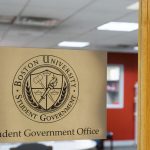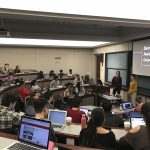Almost one year ago, Brockton resident Felicita Sepulveda made a call to JetBlue asking for a last-minute ticket to Puerto Rico. Just four days after Hurricane Maria struck her family’s homeland, Sepulveda was frantically heading home to search for her brother, who had been missing since the start of the storm.
“Where my mother lived, there was a lot of devastation there,” the 45-year-old said. “And I said, I need to go to Puerto Rico because, standing here, powerless here, waiting for something, it was not going to happen.”
Sepulveda managed to get a ticket for the next morning on a small plane carrying doctors into her hometown, leaving her husband and seven children behind. What she hoped would be a short visit turned into a nine-day stay as the island-wide power outages left Sepulveda without a means to get home.
“It was like a nuclear bomb just went right there,” Sepulveda said. “It was like, my God, this is my island.”
Sepulveda, who lived in Puerto Rico for 19 years before immigrating to the United States, eventually located her brother. Her mother’s house was ultimately left standing, but suffered damages.
Others were not so lucky.
Puerto Rico estimates it will need $139 billion in aid to repair the damages Hurricane Maria caused, according to NPR. After the storm, hundreds of thousands of Puerto Ricans fled the island to find refugee in the states, Sepulveda said. Many of those families settled in Massachusetts, and Sepulveda vowed she would help every one of them find a home.
“All together, I want to say it was [around] 200 families that I helped,” Sepulveda said. “They got housing because of me, but I’m still working with the families because I wanted to work with them until I see the last one find a place to live.”
Sepulveda took a job working at a hotel where Puerto Rican families had been living since the storm. She helped them apply for housing, get driver’s licenses, enroll their kids in school and, ultimately, recover from the trauma of losing everything.
“Yesterday was the one year anniversary, and there are still 189 families living in hotels [in Massachusetts] who still worry every day,” Sepulveda said. “I still see the suffering. I don’t know what to do. These are working people. They want to work, they want a place to live.”
Sepulveda is not alone in her quest to help Massachusetts’s population of displaced Puerto Rican individuals.
Edwin Alicea, president of the Puerto Rican Festival of Massachusetts, said his organization is continuing to help those affected by the storm and has been since last September.
“It’s been a tough year here in Massachusetts,” Alicea said. “We got a lot of families that are still caught up in between [Federal Emergency Management Agency] and going back home, and now, with FEMA not covering expenses, there’s still a lot of suffering going on.”
The Puerto Rican Festival of Massachusetts is an annual, three-day event that, according to its website, “brings together people from all heritages to share our culture.”
Last year, the organization hosted a two-day relief drive at Florian Hall in Dorchester to gather aid for the victims of Hurricane Maria.
“We went to the island, the real hard-hit places,” Alicea said, “and gave out toys because they couldn’t come into the city, and we also helped the hospitals.”
Hurricane Maria hit Alicea particularly hard, he said.
“My father’s out there,” he said. “I have uncles and aunts, and I was there in January and April. It was a very stressful week for all of us. Just trying to keep the food intact with no refrigeration.”
Alicea said his father, who is from Barranquitas, had his whole house swept away by the storm. Alicea said his father “just barely survived.”
Ted McEnroe, director of external communications at The Boston Foundation, agreed that relief efforts were far from complete.
“There is still so much work that needs to be done and so much need on the island,” McEnroe said, “that we feel it’s really important to continue to raise awareness and funds for continued efforts to help communities rebound from this.”
The Boston Foundation created the organization Massachusetts United for Puerto Rico last year and has since raised $3.8 million in donations for displaced Puerto Ricans. The organization has also given out $2.1 million in grants to 68 nonprofits in Massachusetts and Puerto Rico, McEnroe said.
“If we look at it through the grants from Puerto Rico,” McEnroe said, “they’re largely targeting organizations that are looking to help rebuild business areas, helping to support sustainable infrastructure, support small business and entrepreneurship.”
Boston University had a hand in some relief efforts as well. Professor Rady Roldan-Figueroa, who teaches in BU’s School of Theology, assisted students in planning a supply drive last year and said he was involved in other relief efforts around Boston as well.
“As a Puerto Rican, I can tell you that the situation of neglect towards Puerto Rico by the president and the U.S. Congress is appalling,” Roldan-Figueroa said. “Hurricane Maria brought with it an unprecedented level of destruction that overwhelmed an already feeble infrastructure.”
Roldan-Figueroa said he does not think the U.S. government has done enough to assist the people of Puerto Rico.
“Many Puerto Ricans are very patriotic, and they love the United States and feel very proud of their U.S. citizenship,” he said. “However, the political neglect and lack of action on the part of the U.S. Congress has denied them the fundamental right of self-determination.”
Sam Ordóñez, who works with activist group FIRE, which stands for “Fight for Im/migrants and Refugees Everywhere,” said Puerto Rico was suffering long before Hurricane Maria hit.
“You can’t just look at this as starting at the hurricane, or even starting when the fiscal control board was given control of the island,” Ordóñez, a 24-year-old Somerville resident, said. “You have to look all the way back and look at the whole history of the island to really understand the situation.”
Ordóñez said the biggest obstacle to recovery has been the fiscal control board, which was implemented in Puerto Rico in 2016 to combat the Puerto Rican government debt crisis.
“A year out, there’s still tons of public services that haven’t been restored to their previous state,” he said, “and this fiscal control board is pushing even further. They’re closing a bunch of schools and services are being privatized across the island.”





Hey, I am doing a project in school about how Boston is affected by the Caribbean and vice versa and I was wondering if you could help me find some good statistics to make an infographic. Thanks!